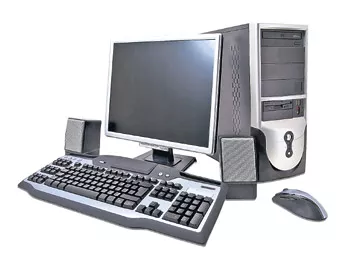
కంప్యూటర్ కి మెదడులాగా పనిచేసే విభాగం?
Computer is an advanced electronic device that takes raw data as input from the user...
Banks Special
Computer Knowledge
Computer Fundamentals
Computer is an advanced electronic device that takes raw data as input from the user and processes these data under the control of set of instructions (called program) and gives the result (output) and saves output for the future use. It can process both numerical and non-numerical (arithmetic and logical) calculations.
A computer has four functions:
a) Accepts data - Input
b) Processes data - Processing
c) Produces output - Out put
d) Stores results - Storage
Input (Data): Input is the raw information entered into a computer from the input devices. It is the collection of letters, numbers, images etc.
Process: Process is the operation of data as per given instruction. It is totally internal process of the computer system.
Output: Output is the processed data given by computer after data processing. Output is also called as Result. We can save these results in the storage devices for the future use.
Computer System
All of the components of a computer system can be summarized with the simple equations.
COMPUTER SYSTEM = HARDWARE + SOFTWARE+ USER
⇒Hardware = Internal Devices + Peripheral Devices All physical parts of the computer (or everything that we can touch) are known as Hardware.
⇒Software = Programs Software gives "intelligence" to the computer.
⇒USER = Person, who operates computer.
Major parts of the Computer:-
Input Devices:
1. Mouse 2. Keyboard
3. Scanner 4. Digital Camera
5. Web Camera 6. Joysticks 7. Track Ball
8. Touch Pad/ Screen
9. Light Pen 10. Bar Code Reader
11. Microphone
12. Graphics Tablets
13. Magnetic Ink Character Reader (Used in Bank)
14. Optical Mark Reader (Used for Answer- Sheet Marking Purpose)
15. Magnetic Card Reader (Used in Shops, Colleges, Stations etc)
16. Biometric Devices
17. Bluetooth
Central Processing Unit (CPU):
The main unit inside the computer is the CPU. This unit is responsible for all events inside the computer. It controls all internal and external devices, performs arithmetic and logic operations. The CPU (Central Processing Unit) is the device that interprets and executes instructions.
Output Devices:
1. Monitor 2. Printer (Dot Matrix)
3. Projector Ink Jet
4. Plotter Laser 5. Speaker
Storage Devices:
1. Primary memory (Main memory)
A. RAM (Random Access Memory / Read-Write Memory)
B. ROM (Read-Only-Memory)
2. Secondary memory (Storage devices)
⇒Hard Disk (Local Disk)
⇒Optical Disks: CD-R, CD-RW, DVD-R, DVD-RW
⇒Pen Drive v Zip Drive
⇒Floppy Disks v Memory Cards
⇒External Hard Disk
Peripheral Devices:
⇒The Modem/ Internet Adapter
⇒Switches/ Hub
⇒Router
⇒TV Tuner Card
Internal Components:
⇒The Mother Board
⇒Expansion Slots
⇒CMOS Battery
⇒Cooling Fan
⇒Network Card
⇒Graphics Card
⇒Power Supply Unit (SMPS)
⇒ Memory Slots
1. UNIVAC stands for?
A) Universal Automatic Computer
B) Universal Array Computer
C) Unique Automatic Computer
D) Unvalued Automatic Computer
E) None of these
2. The brain of any computer
system is ___
A) ALU B) Memory
C) CPU D) Control unit
E) Keyboard
3. The two major types of computer chips are:
A) External memory chip
B) Primary memory chip
C) Microprocessor chip
D) Both b and c E) Both a and b
4. Microprocessors as switching devices are for which generation computers?
A) First Generation
B) Second Generation
C) Third Generation
D) Fourth Generation
E) None of the above
5. What is the main difference between a mainframe and a super computer?
A) Super computer is much larger than mainframe computers
B) Super computers are much smaller than mainframe computers
C) Super computers are focused to execute few programs as fast as possible while mainframe uses its power to execute as many programs concurrently
D) Super computers are focused to execute as many programs as possible while mainframe uses its power to execute few programs as fast as possible
E) None of the above
Key
1) A 2) C 3) D 4) D 5) C













